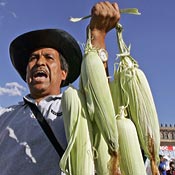 Wal-Mart announced yesterday plans to open 300 new units in Mexico this year. That’s almost one every day. Since the first one opened in 1991, Wal-Mart has steadily been taking over the Mexican economy. Thanks, in part, to NAFTA stipulations, it now even has its own claim in the stock market. The multinational corporation has expanded their operations and bought out competing companies. Their holds in the country now include:
Wal-Mart announced yesterday plans to open 300 new units in Mexico this year. That’s almost one every day. Since the first one opened in 1991, Wal-Mart has steadily been taking over the Mexican economy. Thanks, in part, to NAFTA stipulations, it now even has its own claim in the stock market. The multinational corporation has expanded their operations and bought out competing companies. Their holds in the country now include:
- Wal-Mart Supercenters
- SAM’S Club
- Bodega Aurrera (grocery supercenter)
- Superama (grocery supercenter)
- Suburbia (high-end supercenter)
- Vips (restaurant)
- Banco de Wal-Mart (banking firm)
Wal-Mart participates in charity work as well. In 2009, Wal-Mart
- Gave 22 tons of food to flood victims in Michoacán, a state in northern Mexico
- Gave 100 tons of food to Haiti relief efforts and 2 billion pesos to the Red Cross
- Built 4,198 family orchards
- Fed 13,590 undernourished children
Currently Wal-Mart has over 174,000 employees and plans to create 7,000 permanent jobs with the store openings this year. They will invest an unprecedented 12.5 billion pesos in the operations, up 28% from last year.
But who will actually “save money, live better?”
According to WakeUpWalmart.com for every two jobs Wal-Mart creates, three are lost. This is due largely to the fact that the transnational company puts smaller, local stores out of business. Not only that, the locations Wal-Mart chooses to build are often prime agriculture fields. When I traveled to Mexico last summer I saw entire villages plowed over by the opening of one of these mega-stores, displacing hundreds and hundreds of people.
For a company whose social responsibility pillars enumerate goals such as “promote sustainable feeding of less fortunate communities in Mexico” and “promote competitiveness,” are they practicing what they preach?
